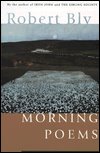Masculine/Feminine
 As part of my new one-poem-a-day resolution, I'm now reading the poetry of Robert Bly. I started with poems by Mary Oliver, needed a change of pace and so picked up from the bookstore Morning Poems by Bly -- rather blindly, because I didn't know anything about Bly's poetry. But this volume is slim, bound in good paper, and has a cover that caught my eye. I'm ashamed to admit that that's how I choose new books, but there it is. Surfaces are important sometimes.
As part of my new one-poem-a-day resolution, I'm now reading the poetry of Robert Bly. I started with poems by Mary Oliver, needed a change of pace and so picked up from the bookstore Morning Poems by Bly -- rather blindly, because I didn't know anything about Bly's poetry. But this volume is slim, bound in good paper, and has a cover that caught my eye. I'm ashamed to admit that that's how I choose new books, but there it is. Surfaces are important sometimes.It's very intriguing to read Bly after Oliver. Oliver's poems are like a patch of sunny grass you can lie on with your hands under your head and watch clouds scud across the sky. Sometimes a bird flies over and throws a shadow on your face and you feel the chill of sorrow and death, but only for a moment. Bly's poems are like cold mountain lakes bracing to swim in. They catch you unprepared sometimes; and they leave you puzzled, unsettled, hungry for answers that cannot be had. His language is so simple, and yet every word pierces the skin. I couldn't figure out why that was until I read a poem out loud to Husband and he said, "His syntax is kind of strange." Well, that is it, that's one of Bly's secrets, if I can call them that, in Morning Poems.
I found out from the book's back cover that Bly was part of the men's movement; his poetry is described as full of masculine energy -- and immediately my oversensitive misogyny-detecting antennae started twitching uncomfortably. I'm really suspicious of this masculine/feminine categorization ofwriting syles; I see it as a value judgment more than simply a description. And the values that I'm sure are meant are masculine equals good, solid, truth-telling writing, and feminine equals soppy, sentimental, weak writing. The strange thing is, though, that in trying to make sense of the difference between Oliver's and Bly's poems I could think of no better way to distinguish them than seeing them as examples of the feminine versus the masculine approach. Yes, I plead guilty. But that leads me to think about how we use these words, masculine and feminine, and how difficult it is to separate them from the associations that have accumulated on them, like barnacles on the hull of a ship, over these many years of male-centered history- and literature- and myth-making.
And now I have come, inevitably, to the feminist movement, which I know so little about. And what I know is probably incorrect. But this is what I've always thought: that the goal of the feminist movement was to make women more like men. Not to argue that being a woman is as good and valid and important as being a man, but that the only way to make being a woman as good as being a man is to become more like a man -- to vote like a man, to work like a man, to think like a man. I've internalized this idea -- drank it in as if it were a pitcher of water after a long trek through the desert. But I'm beginning to question it.
But the thing is that Bly's poetry isn't masculine or feminine. It's just awfully good. I'll settle for that right now.
The Glimpse of Something in the Oven
by Robert Bly
Childhood is like a kitchen. It is dangerous
To the mice, but the husband gets fed; he's
An old giant, grumbling and smelling children.
The kitchen is a place where you get smaller
And smaller, or you lose track. In general
You become preoccupied with this old lady
In the kitchen.... She putters about, opens oven doors.
The thing is the old woman won't discuss anything.
The giant will. He's always been a fan of Aristotle,
Knew him at school. It is no surprise to him
That the Trojan War lasted ten years, or how it
Ended. He knows something you don't.
Your sister says, "Say, what's that in the oven?"


0 Comments:
Post a Comment
<< Home